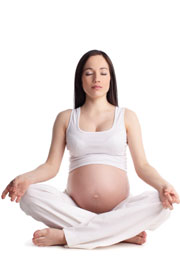Let me tell you about a woman I know. She is a cradle Catholic and firm pro-lifer, happily married to a supportive and loving husband. She lives in a modern apartment in a safe, friendly neighborhood, and her family’s income is enough to provide for their necessities and a few luxuries too. She has a wonderful support group of like-minded family and friends. But last year, she became unexpectedly pregnant and it was one of the biggest crises she ever faced.
She was thrown into panic–she had two children under 4, and already felt overwhelmed; she was on anti-depressants; they already had four people squished into a 3-room apartment, and couldn’t afford to move; they had enormous student debt; and her husband was scheduled to be in the middle of an unpaid internship the month the baby was due. She worked a physically demanding part-time job, and the pregnancy brought with it panic attacks, severe insomnia and nightmares, back pain so bad it made her limp for a few months, and depression that occasionally reached the point of suicidal thoughts. She was angry at God, afraid of the future, and resentful of the baby. She felt horribly guilty that she couldn’t view the baby in her womb as anything but a burden, and she felt ashamed to be so overwhelmed when she had such a fortunate life. She was so scared of another pregnancy after this one that she was flooded with temptations to take birth control or get sterilized. And once, at the darkest point, the thought of abortion came into her mind.
This woman is me. I couldn’t believe it. I didn’t think it was possible for someone as fortunate as me to have a crisis pregnancy. Thanks to God, and to my marvelous group of friends and family, the temptation never returned. But it opened my eyes to the fact that anyone can have a crisis pregnancy…and this means that anyone can be tempted by abortion. I already knew that many women get pushed into abortions, and suffer terrible guilt afterwards; but now I felt like I understood what they have gone through. I gained a much deeper compassion for women planning or recovering from abortions, a compassion which I hope will continue to guard me against ever stereotyping or vilifying them.
I also learned something about the pro-life movement (or at least, that part of it that I’ve experienced): we are so concerned with welcoming new life and affirming the blessing of parenthood that we pretend we’re always happy about it. When a woman like me finds herself in a crisis pregnancy, she may be scared to admit it. After all, doesn’t she realize how many infertile people would kill to be in her position? And doesn’t she understand what a blessing fertility is? And shouldn’t she make sure everyone sees her joy, so she can witness to the Gospel? When a pro-life woman with several kids gets the usual “are you done yet?” or “how on earth can you manage?” comment in the supermarket, she feels compelled to reply with something enthusiastic, like “we’re happy to have as many children as God gives us!” or “oh, we love having a house full of little ones!” I used to always have a cheerful reply like this waiting, so I could be a good witness for the secular world. But during this pregnancy, things were so bad that I couldn’t muster up a pro-life rallying cry. I couldn’t even joke about the trials of pregnancy. It was deadly serious. So instead, I started admitting to people–first my husband, then my friends, then even my coworkers–that I was not expecting this, and I was having a hard time. And suddenly, I didn’t feel alone anymore. No one responded with “oh look, she was pro-life until she got pregnant!” or “I’m glad I’m not Catholic, I wouldn’t want to be drowning in diapers like her!” Instead, I received the support and sympathy I needed.
Looking back, I think this may actually be a good form of witness, too. Certainly, it’s good for secular people and pro-choicers to see examples of joyful parenthood; but it’s also good for them to see that, even when parenthood is a crisis, it’s worth it. As a priest once said to me, you can’t be sure that you’re faithful until temptation comes along and you resist it. You won’t really know that you’re pro-life until you are tempted with abortion and choose life; and nobody else will know it, either. By all means, let’s show the world how happy a life open to God can be. But let’s also be someone they can relate to–for their sake and for ours.
Many thanks to the strong and amazing Rebecca Frech, at the blog, Shoved to Them, whose post about crisis pregnancy inspired me. These thoughts have been on my heart for a long time, but her post crystallized them in my mind and inspired me to write. Her follow-up post gets a little more specific about temptation to abortion and solidarity with post-abortive women. And by the way, here is the happy ending:

I love this baby more than I have ever loved anyone else in my entire life. I can’t help thinking that some of that is due to the hell I went through to bring her into the world. I paid for her with my blood, sweat, and tears and she was worth it!

